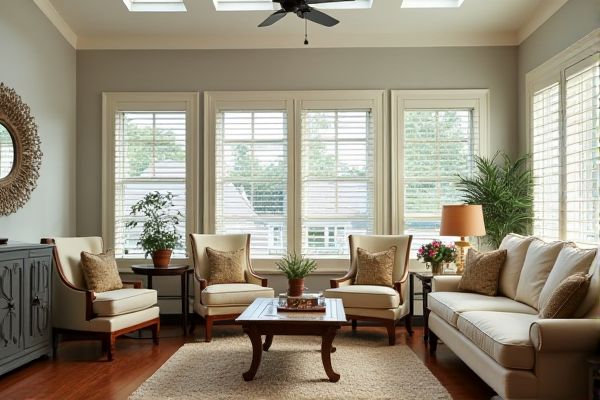
Plantation shutters offer superior insulation and a timeless aesthetic for sunrooms, enhancing privacy while allowing customizable light control through wide louvers. Your choice between shutters and venetian blinds impacts not only the room's style but also energy efficiency and maintenance--explore the rest of the article to discover which option best suits your sunroom needs.
Table of Comparison
| Feature | Plantation Shutters | Venetian Blinds (Sunroom) |
|---|---|---|
| Material | Wood or faux wood | Aluminum, wood, or PVC |
| Light Control | Excellent - adjustable louvers for precise control | Good - adjustable slats but less precise |
| Durability | High - resistant to warping and fading | Moderate - can bend or fade in sunlight |
| Maintenance | Low - easy to clean with a damp cloth | Moderate - requires regular dusting and occasional washing |
| Privacy | Strong - tightly fitting louvers block visibility | Moderate - slats allow partial visibility |
| Insulation | Effective - provides thermal insulation | Minimal - limited insulation properties |
| Style & Aesthetics | Classic, timeless look ideal for sunrooms | Modern, versatile style with various colors |
| Cost | Higher initial investment | Lower to moderate cost |
| Installation | Permanent & custom fit | Easy to install and replace |
Introduction: Choosing Window Treatments for Your Sunroom
Plantation shutters offer superior insulation and light control for your sunroom, enhancing energy efficiency while providing a classic, elegant look. Venetian blinds allow for adjustable light direction and are available in various materials, making them versatile for changing sunroom aesthetics. Your choice depends on whether you prioritize durability and style or flexibility and budget-friendly options.
Plantation Shutters vs Venetian Blinds: Key Differences
Plantation shutters provide a durable, stylish option with adjustable louvers that offer precise light control and enhanced privacy, ideal for sunrooms. Venetian blinds consist of horizontal slats that can be tilted or raised, offering versatility but less insulation compared to shutters. For your sunroom, plantation shutters improve energy efficiency and add a classic aesthetic, while venetian blinds provide budget-friendly flexibility and easier maintenance.
Aesthetic Appeal: Enhancing Sunroom Style
Plantation shutters offer a timeless, classic look that adds architectural interest and enhances the overall elegance of your sunroom, while Venetian blinds provide a sleek, modern appearance with clean horizontal slats that complement contemporary designs. The wide louver design of plantation shutters allows for adjustable light control and privacy, creating a warm, inviting atmosphere with a touch of sophistication. Venetian blinds, often made from aluminum or wood, offer versatile color options and easy maintenance, making them a practical yet stylish choice for enhancing your sunroom's aesthetic appeal.
Light Control and Privacy Comparison
Plantation shutters offer superior light control with adjustable louvers that allow precise regulation of sunlight, making them ideal for sunrooms where you want to balance brightness and shade. Venetian blinds provide flexible privacy options through tilting slats, but may allow more light leakage compared to the tighter seal of plantation shutters. Your choice depends on whether you prioritize the enhanced privacy and light blocking of shutters or the adaptable light filtering of Venetian blinds.
Energy Efficiency: Insulation Benefits
Plantation shutters provide superior insulation benefits compared to Venetian blinds, helping maintain consistent indoor temperatures in your sunroom. Their thick, adjustable louvers minimize heat transfer, reducing energy costs by preventing heat loss in winter and heat gain in summer. Choosing plantation shutters can enhance your sunroom's energy efficiency, making them a smart investment for year-round comfort.
Durability and Longevity in Sunrooms
Plantation shutters offer superior durability in sunrooms due to their solid construction from hardwood or composite materials, making them resistant to warping and fading caused by prolonged sun exposure. Venetian blinds, typically made from aluminum or PVC, have a shorter lifespan and are more prone to damage from heat and moisture commonly found in sunrooms. Choosing plantation shutters for your sunroom ensures long-lasting performance and retains aesthetic appeal over time despite intensive sunlight.
Ease of Maintenance and Cleaning
Plantation shutters in sunrooms require minimal maintenance, with wide slats that are easily wiped down using a damp cloth, preventing dust buildup. Venetian blinds involve more intricate cleaning due to their numerous narrow slats, often necessitating individual dusting or specialized tools to reach tight spaces. Both options resist sun damage, but plantation shutters provide a more durable, low-maintenance solution for long-term cleanliness.
Installation Process and Customization Options
Plantation shutters offer a more permanent installation process, typically requiring professional measurement and fitting to ensure a precise, custom look that complements your sunroom's architecture. Venetian blinds provide a simpler, often DIY-friendly installation with adjustable slats for light control but less opportunity for full customization in materials and design. Your choice depends on whether you prefer tailored, durable window treatments or flexible, easy-to-install options for your sunroom's unique ambiance.
Cost Analysis: Plantation Shutters vs Venetian Blinds
Plantation shutters typically involve a higher upfront investment, averaging $15 to $30 per square foot, compared to Venetian blinds, which can cost between $10 and $20 per square foot depending on materials and customization. While plantation shutters offer durability and energy efficiency, potentially reducing long-term utility bills, Venetian blinds provide a more budget-friendly option with easier replacement and maintenance. Your choice will depend on balancing initial expenditure with long-term value and aesthetic preferences for your sunroom.
Which Is Best for Your Sunroom? Final Verdict
Plantation shutters offer superior insulation and light control, making them ideal for sunrooms that require energy efficiency and privacy. Venetian blinds provide greater flexibility in adjusting light levels and are often more budget-friendly, suitable for sunrooms with varying sunlight exposure. For sunrooms prioritizing durability and aesthetics, plantation shutters are the best choice, while venetian blinds excel in cost-effectiveness and ease of maintenance.
 homyna.com
homyna.com